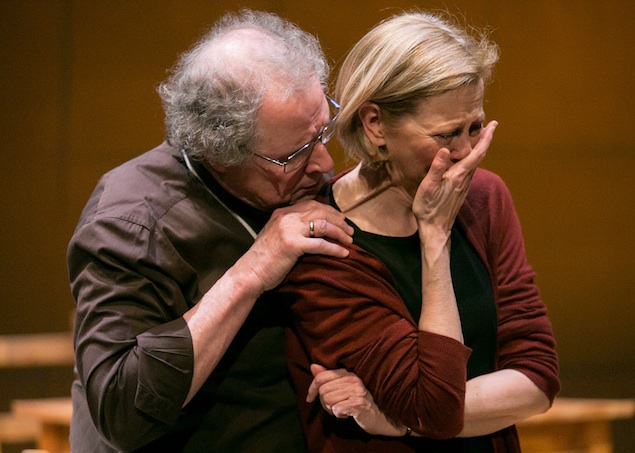Donald Rumsfeld suffered much derision for his garbled statement about known knowns and unknown unknowns in the year leading up to the Iraq War, but being in the uncomfortable position of knowing what we don’t know sustains much of the tension throughout The Admission, Motti Lerner’s new play at Theater J.
From the moment Giora (Danny Gavigan) is informed of a dissertation that points fingers at his own father, among others, for killing hundreds of Arabs in the village of Tantur in 1948, the hard facts of what actually occurred become less important than the question of whether they should be uncovered or laid to rest. It’s a question Theater J has grappled with, too, after the controversy that arose when its decision to stage The Admission was announced. Lerner, Theater J artistic director Ari Roth, and the packed house in attendance on opening night obviously believe in the imperative of art to examine impossible questions, while protest groups have decried the company’s “blood libel” against Israeli soldiers, saying that accusations of a massacre of Palestinian villagers are groundless.
Theater J’s response to the controversy was to pare down the production from 34 performances to 16 and present it as a “workshop” run, with minimal design elements. It’s a decision that ultimately benefits the show enormously—Sinai Peter’s streamlined show places the emphasis on the actors, primarily the haunted Gavigan, carrying the physical scars from his own time serving in the army in Lebanon in the two crutches he uses to get around; and Michael Tolaydo as his father, Avigdor, who uses maddening, labyrinthine explanations to excuse himself both to his family and to his own conscience.
The play is loosely based on Arthur Miller’s All My Sons, in which another wounded veteran confronts the guilt of his previously unimpeachable father, meaning there’s also a romantic conflict in Giora’s life that in this particular context often feels like a distraction. Giora is engaged to Neta (Elizabeth Anne Jernigan), with whom his parents desperately want him to settle down, but he still carries an Olympic-size torch for Samya (Leila Buck), an old colleague at the university where he teaches, and an Israeli Arab whose brother (Pomme Koch) has benefited from Avigdor’s altruism, but whose father (Hanna Eady) attempts to stab him in what appears to be a fit of madness but is considerably more complicated.
The show hinges on Giora, and Gavigan’s strong, layered performance carries the weight of the production. Giora bears his own guilt for killing women and children while targeting terrorists as an Israeli soldier in Lebanon, and his brother died in combat, giving him some insight into the impossible morality of war even before his father’s implied guilt begins to take over his life. At the end of act one, Avigdor confesses that his regiment killed, yes, but only 70 at most, not the 150 or even 220 that he’s accused of massacring, and that he was compelled to continue shooting to calm down the angry mob of thousands who surrounded him. The timing of this statement feels unfortunate, because it diminishes the tension of act two and makes Giora’s constant entreaties to his father start to feel a little repetitive.
It’s possible the show might function better as a single-act production with a faster tempo—at its current pace, the two-hour running time feels overly ponderous, even with the bombshells flying around the stage like Giora’s infamous grenades. Having revelation come in the middle of the show lets some of the air out of the bubble before its inevitable implosion. Still, Peter’s remarkably sophisticated “workshop” manages to elegantly consider the thorny dilemma of opening old wounds. The Admission’s case, and one Theater J offers significant proof for, is that it’s a necessarily painful stage in the overall process of healing.
The Admission is at Theater J through April 6. Running time is two hours, including one intermission. Tickets ($45) are available via Theater J’s website.


















